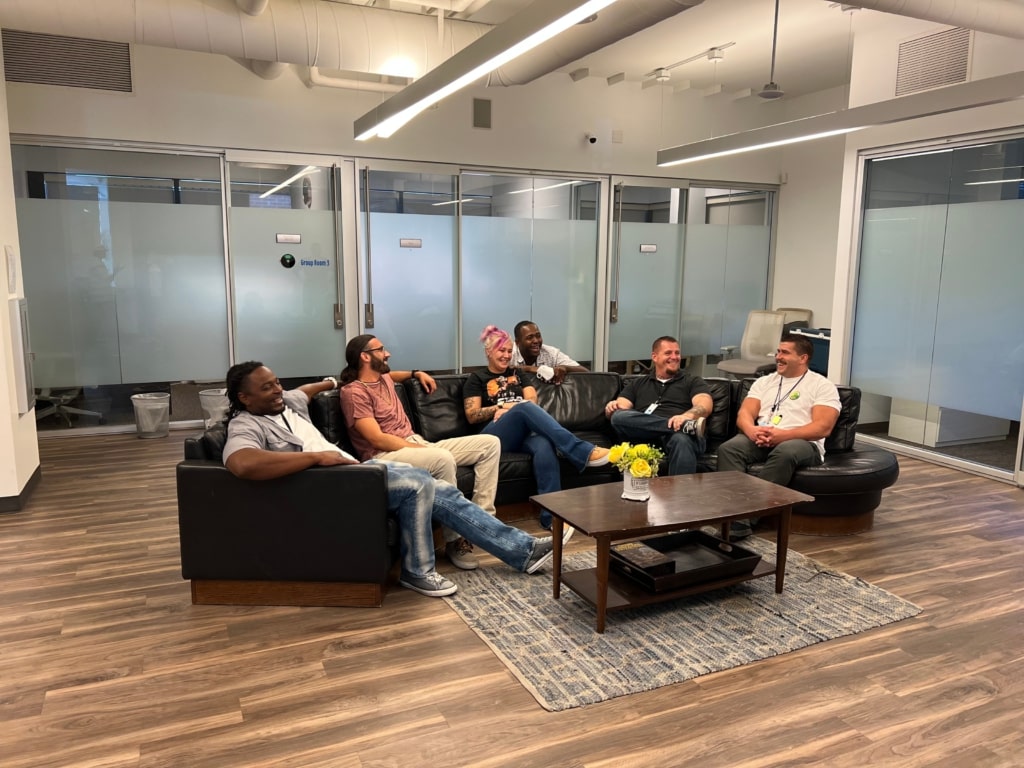Home » Treatment Services
Our Clinical Approach
South Coast Behavioral Health’s clinical approach to substance abuse treatment is holistic in nature to mend the connection between the mind, body, and spirit.
We're here because we've been there
After filling out this form, our admissions team will contact you at the number provided.
"*" indicates required fields
As a clinically-based program, our programs integrate research-based treatment services in addition to our holistic healing practices to provide diverse care to each person in our care.
Recovery doesn’t just take place on a conceptual basis. You must also learn to land in your body again, feel your emotions, and heal from the inside out. Recognizing the indisputable connection between body and mind, our highly credentialed treatment services staff uses an integrative approach to treatment. We draw on traditional, research-based therapies like cognitive behavioral therapy (CBT), dialectal behavior therapy (DBT) and acceptance and commitment therapy (ACT) as well as experiential approaches like yoga, psychodrama, family therapy, and expressive art therapy.
Your specific treatment plan for drugs and alcohol will be individualized to your most pressing clinical needs as well as your preferences, goals, and life experiences. Our therapeutic approaches combined with our alumni program, recovery resources and focus on relapse prevention make South Coast a premier residential and outpatient treatment option in Orange County, CA.
The Core Ideals Driving Our Clinical Approach
- Safety
Many of our patients have a limited perception of what safety means to them. patients with a trauma history tend to experience skewed forms of trust. It is our goal to re-establish the development of safety in various ways throughout treatment at South Coast.
- Individuality
No two patients are alike, which is why your participation is needed and your suggestions are encouraged so that we can build out a truly life-changing treatment plan together.
- Education
As clinicians, our learning process is never-ending. We value staying informed with new findings and approaches that could impact our knowledge, helping us to treat you more effectively. Our clinical team is highly motivated to stay current in our therapeutic communities.
- Collaboration
We take a collaborative approach, because there is no one that knows you better than you know yourself. Your input matters, and it will help us learn more about you and provide the best treatment possible to you
- Community
Not only our clinicians can provide therapeutic experiences, which is why we highly value the community-based system we provide. In addition to your therapist, you will be sharing a home with your peers. Like a built-in network, your peers are there to recover but also provide the opportunity of experiencing recovery together. We can say you are not alone, but this way— we are showing you that you never have to be. Connection is key in recovery, and our community proves it.
We apply our distinctive clinical philosophy in treatment during all levels of care that we offer here at South Coast. In leading the way for true recovery to happen, we wish for all of our patients to trust in sobriety, having done the work to build a strong foundational knowledge of themselves, connection to a community, and acknowledgment of any future obstacles to wellness and how to counteract them.
A Comprehensive and Integrative Approach
South Coast offers a full continuum of care that includes sub-acute medical detox services, residential treatment, partial hospitalization, and intensive outpatient. We are a culturally sensitive, research-based treatment center that blends traditional and holistic approaches to address the physical, emotional, and spiritual wounds of addiction and mental health treatment.

Our Clinical Approach
Our programming at South Coast can take on different therapeutic intentions. We view the recovery process from a perspective of our care organized into three pillars. Our therapeutic intentions shift as Patient’s reach another ‘pillar’ of the recovery process within our full continuum of care.
Our three pillars of the recovery process, include:
Stablization
Through a series of psychiatric and medical assessments, we learn about each Patient before devising a treatment plan tailored to him or her. In doing so, we assist our patients in stabilizing their condition.
Building
During this stage, we lay the foundation for recovery by working with each Patient through a series of treatment methods and therapies to address the motives behind his or her substance abuse.
Maintenance
With continued support and clinical guidance, patients learn how to maintain their sobriety. More specifically, patients learn to balance recovery with life, work, relationships, and recreational settings.
Get A Confidential Assessment From A Recovery Specialist
Our Clinical Philosophy
South Coast Behavioral Health takes an integrative holistic approach to your healing, meaning we provide recovery to your mind, body, and spirit. We use traditional and comprehensive treatment methods to accomplish this. South Coast is a trauma-focused clinical environment that aims to treat the underlying motivators of the behavior of substance abuse. Not all treatment centers are the same, entrust your addiction recovery and mental health treatment to a professional drug and alcohol recovery center.
At South Coast, our primary therapeutic objectives are as follows:
- Deliver therapeutic styles catered to understanding the Patient’s mind.
- Re-establish the Patient’s development of safety.
- Understand the impact of the Patient’s trauma on day-to-day life.
- Re-connect the Patient with family, loved ones, and other people.
Mind
We treat the condition of your mind by first assessing you for any disorders that may be co-occurring with your substance abuse. By treating mental conditions simultaneously with your alcohol or substance use disorder, you will be able to find true healing without the confusion of continued symptoms from either disorder. Our dual diagnosis treatment allows for clarity of the mind and helps you feel better, faster. Some symptoms from mental health disorders can appear similar to symptoms experienced as a result of substance use disorders, therefore, it is always our first step to assess and evaluate your symptoms to trace them back to the true condition. From this starting point, we employ a variety of behavioral therapy methods in addition to psychiatric sessions and medication management for your co-occurring disorder(s).
We place a high value on the condition of our Patient’s mental health because it gives us a greater understanding of the behavior of substance abuse. Without focusing on our Patient’s mental health, we cannot understand the motivations behind their drug or alcohol abuse. Our primary objective in the clinical work we do at South Coast is to establish the ‘why’— why our patients began using drugs or alcohol. This ‘why’ is most important, and takes precedence over understanding the reason our patients continued to use substances despite the negative consequences it brought. Most often, individuals struggling with addiction initially start using drugs or alcohol as a coping mechanism. Why they need to cope is what we need to treat. These underlying reasons that motivate drug or alcohol abuse, if left untreated, can trigger a relapse or other maladaptive coping mechanisms to form. Learning coping mechanisms and life skills is a key component to addiction and mental health treatment.
Body
We treat the condition of your body by providing medical treatment around the clock, in the form of doctors and nurses who specialize in addiction medicine. Our goal in your medical treatment is to efficiently detox your system from any substances, returning your body to equilibrium. We prioritize your health, needs, underlying conditions, and your best interest during this process.
Spirit
We treat the condition of your spirit by offering a myriad of experiential therapies and providing opportunities to connect with yourself and others authentically.
We view our treatment at South Coast as a pivoting point for individuals who would like to maintain long-term sobriety. Addiction recovery is an ongoing process, it is our job to provide a safe space and lay the path that you will continue down the road to long-term sobriety.
We give you access to clinicians with no exceptions, because when we say we are by your side— we mean it. Your clinical needs will be met 24/7. We understand what you’re going through during early and extended recovery, which is why we are attentive to your needs and expressed concerns from the moment you become a Patient. We believe in the power of healing through a strong connection with your therapist. Our hope is for each therapy session to provide insight and a renewed sense of ambition. Our expectation is that you remain open, honest, and willing to make the changes that support the treatment plan we will devise together.
Medication Management for Co-Occurring Mental Health Disorders
Dual Diagnosis Treatment
Dual diagnosis treatment services build healthy habits for our patients through full-service psychiatric care alongside substance use disorder treatment, for a sustainable recovery.
Psychiatric Care
Our psychiatrists, medical doctors, and clinicians collaborate to provide psychiatric support to ensure the appropriate treatment of any co-occurring disorders.

Holistic and Wellness Services
To support whole-person healing, we offer a range of holistic approaches to complement our traditional therapies.
Some alternative treatments we offer include:

Nutrition and Wellness
Our nutrition services help you learn healthier nutrition habits while incorporating your personal dietary needs. You can also participate in a variety of therapeutic exercises to improve your overall wellness including physical activities, yoga, and mindfulness-based skills training. These services help you to reduce stress and anxiety, enhance self-esteem, and manage triggers in a healthy way.

Expressive Art Therapy
Creating art gives you a way to express emotions and thoughts that you find difficult to put into words. It can serve as a way to calm yourself, manage emotions, and as a creative outlet and an ongoing coping skill in recovery. Art therapy may include painting, collages, coloring, photography, drawings, and clay.

Mindfulness and Breathwork
We offer mindfulness through breathwork as well as movement and meditation. Mindfulness can provide a personal, powerful, and transformational experience that supports acceptance, staying grounded, and being in the moment.

Yoga as Therapy
Research suggests that the practice of yoga modulates the stress response. Mental health and physical health are not just closely allied but are essentially equivalent. Yoga uses stretching, balance, poses, and breathing to help you stay centered in the present moment and release physical tension and stress tied to emotions.
Research-based Clinical Programming
Our research-based practices provide tested and true clinical approaches for our patients. Clinicians will use a wide range of therapeutic methods to offer healing in the most optimal way for each individual Patient. Because our programs are individualized, your treatment plan can include the therapy types that most resonate with your learning style and meet your needs specifically.
Cognitive Behavioral Therapy (CBT)
CBT helps you identify the link between unhealthy thoughts and behaviors. Your therapist will teach you to recognize dysfunctional thought patterns, challenge them, and replace them with healthier alternatives.
Learn More
Dialectical Behavioral Therapy (DBT)
Dialectical behavior therapy teaches you skills and strategies for recovery like mindfulness, emotion regulation, distress tolerance, and interpersonal effectiveness. DBT sessions focus on the present moment, teaching healthy coping skills and improving interpersonal skills.
Eye Movement Desensitization & Reprocessing (EMDR)
EMDR helps individuals process traumatic events that may have caused their addictions in the first place so they can heal and move forward in a positive direction. The eye movements help to break the cycle of stress reactions created by the memories and allow patients to restructure negative thought patterns and behaviors. Ultimately, EMDR helps those grappling with addiction gain insight into how these issues began, restore hope for their future and create a positive outlook on life.
Psycho-education
Psychoeducation is known to increase a person's understanding of their condition and the potential consequences of continuing down this path. Through psychoeducation, patients are able to identify unhealthy patterns in thought and behavior that often lead to addiction, and learn how to combat them over time.
Family Systems Therapy
Family systems therapy is a form of therapy that focuses on interpersonal relationships within family units, and it has become an invaluable component of addiction treatment in many recovery programs. This approach to family therapy is particularly effective when the individual struggling with addiction identifies multiple issues within their family, such as communication and relationship dynamics, that can have an impact on their journey to sobriety.
Acceptance and Commitment Therapy (ACT)
The purpose of Acceptance and Commitment Therapy (ACT) is to help individuals struggling with substance use accept their condition while also giving them tools they can use to make positive changes. ACT delivers its objectives through focused exercises that assist people in distancing themselves emotionally fromunwanted behaviors to look at things objectively, inspiring a determination that makes sobriety achievable.
Problem-solving Therapy
Problem-solving therapy (PST) is a type of cognitive-behavioral therapy approach, focused on problem-solving and developing coping strategies to better process stressors. This evidenced-based method can be especially beneficial for those in addiction treatment, as it both teaches problem-solving skills and helps reduce cravings through problem management.
Life Skills Training
Life skills training focuses not only on reducing or abstaining from problem behaviors but also building skills to help increase self-efficacy and promote life satisfaction and well-being. Life skills training helps build life skills, such as communication, boundary setting, relationship building, stress management, conflict resolution, and problem-solving.
Support Groups
Patients who engage in peer support find that talking to people who have been through similar challenges and understand the complexities of addiction can foster emotional healing. During peer groups, members are free to express feelings of fear, shame, guilt, and hope. Additionally, peer coaching techniques often focus on real-life skills such as developing relapse prevention plans or learning how to ask for help.
The Treatment Experience at South Coast
Here Is What Our Alumni Have to Say!
Let us help you take back your life.
You are the most important individual that we can help. You matter to us in ways that we cannot describe in words. Your life has value, and no matter how broken you think you are, we are here to help put the pieces back together.